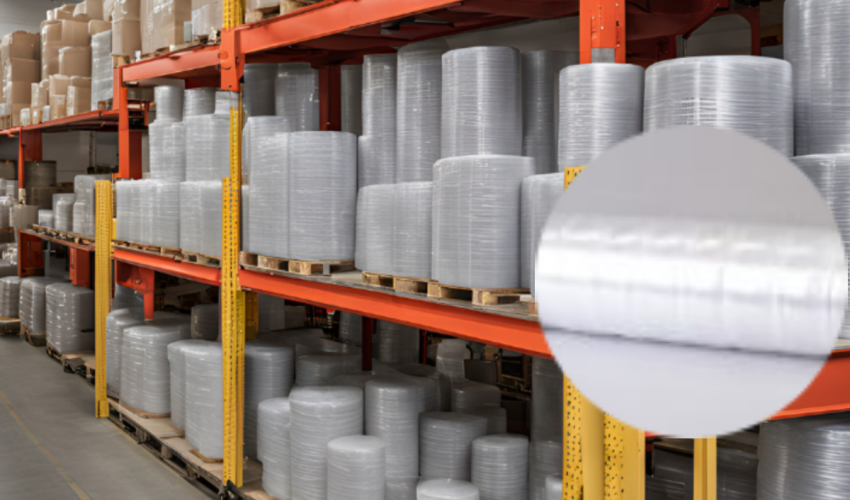
Wrapped produce pallets play a crucial role in the supply chain by ensuring that fresh fruits and vegetables reach their destination in optimal condition. These pallets provide a protective barrier against environmental factors such as moisture and physical damage, which can compromise the quality of perishable goods. The addition of breathable stretch film further complements this protection by allowing air circulation, helping to maintain freshness while safeguarding the produce. Together, wrapped pallets and breathable stretch film work in tandem to prevent moisture buildup and reduce the risk of spoilage, ensuring that products remain in peak condition throughout transportation and storage. This combined approach helps businesses preserve product quality, enhance customer satisfaction, and minimize waste. As consumers increasingly demand fresh and high-quality produce, the effectiveness of wrapped produce pallets becomes even more significant in meeting market expectations and maintaining a competitive edge.
Wrapped produce pallets offer numerous benefits that significantly enhance the transportation and storage of fresh goods. By providing a robust layer of protection, these pallets help maintain the quality of produce while minimizing losses due to damage or spoilage.
Wrapped produce pallets are designed to safeguard goods from various threats during transit. The protective wrap shields the produce from impacts, moisture, and contaminants, which can lead to deterioration. Key benefits include:
The proper wrapping of produce is essential in prolonging the freshness and shelf life of perishable items. When using wrapped produce pallets, businesses can benefit from:
In addition to protecting produce, wrapped produce pallets also contribute to cost savings for businesses. Some of these financial benefits include:
While focusing on the benefits of wrapped produce pallets, it is also important to consider their environmental impact. Many wraps available today are designed to be recyclable or made from biodegradable materials, promoting sustainability within the supply chain. Some advantages in this context include:
The use of wrapped produce pallets significantly enhances the efficiency and effectiveness of transporting fresh goods. With their ability to protect against damage and spoilage, extend shelf life, and provide cost savings, these pallets are an essential component in the supply chain for businesses dealing with perishable items. By investing in quality wrapping solutions, companies can ensure the safety and quality of their products while also contributing to environmental sustainability.
The wholesale market for wrapped produce pallets has become increasingly important as the demand for fresh produce continues to grow. Retailers and distributors recognize the value of using wrapped produce pallets to enhance their supply chain efficiency and maintain the quality of perishable goods. This section explores the dynamics of the wholesale market and highlights the numerous benefits of bulk purchasing.
The wholesale market for wrapped produce pallets encompasses a range of suppliers, manufacturers, and distributors focused on providing effective wrapping solutions for the food industry. As the importance of product safety and quality increases, more businesses are turning to wrapped produce pallets to meet consumer demands. Key aspects of this market include:
Purchasing wrapped produce pallets in bulk offers several advantages for retailers and distributors, helping them streamline their operations and enhance overall profitability. Key benefits include:
The trend towards sustainability is a crucial factor in the wholesale market for wrapped produce pallets. As consumers become more environmentally conscious, businesses are recognizing the need to adapt their practices. Benefits of focusing on sustainable practices include:
The wholesale market for wrapped produce pallets is a vital component of the fresh produce supply chain. By purchasing in bulk, retailers and distributors can enjoy significant cost savings, ensure a consistent supply, and enhance their inventory management processes. As sustainability continues to shape market dynamics, businesses that embrace eco-friendly practices in their wrapping solutions will not only meet consumer demands but also contribute to a more sustainable future. Investing in quality wrapped produce pallets is essential for maintaining product quality and securing a competitive edge in the market.
As businesses increasingly focus on sustainability, reusable pallet wraps have emerged as a vital solution for enhancing the efficiency and environmental friendliness of wrapped produce pallets. These innovative wraps provide an effective alternative to single-use options, allowing companies to reduce waste while maintaining product quality during transportation and storage.
Reusable pallet wraps are designed to be used multiple times, making them an eco-friendly option for businesses dealing with fresh produce. The pallet wrap design focuses on durability and strength, ensuring the wraps can withstand repeated use without losing effectiveness. This helps companies reduce waste and lower packaging costs over time. By adopting these wraps, businesses can significantly decrease their environmental footprint, as fewer replacements are needed, and products remain well-protected during transport. Key benefits of reusable pallet wraps include:
When evaluating the choice between reusable and single-use wraps for wrapped produce pallets, it is essential to consider both the cost and environmental impact. Below is a comparative analysis of the two options:
| Aspect | Reusable Pallet Wraps | Single-Use Wraps |
|---|---|---|
| Initial Cost | Higher upfront investment | Lower initial cost |
| Long-Term Savings | Significant savings over time due to repeated use | Ongoing costs with each purchase |
| Durability | More durable, withstands multiple uses | Generally less durable |
| Waste Generation | Minimal waste, designed for reuse | High waste, contributes to landfill |
| Environmental Impact | Eco-friendly, reduces plastic pollution | Contributes to environmental harm |
| Storage Requirements | Requires proper storage for longevity | Minimal storage space needed |
The environmental impact of packaging is increasingly scrutinized by consumers and regulators alike. Here are some key factors highlighting the importance of choosing reusable pallet wraps:
Incorporating reusable pallet wraps into the logistics of wrapped produce pallets represents a significant step towards a more sustainable and cost-effective packaging strategy. By understanding the benefits of these wraps and their environmental impact, businesses can make informed decisions that not only enhance their operational efficiency but also align with the growing consumer demand for eco-friendly practices. Ultimately, investing in reusable pallet wraps can lead to long-term savings, improved brand loyalty, and a positive contribution to environmental conservation.
When considering the transition to reusable pallet wraps for wrapped produce pallets, understanding the associated costs is essential. This section provides a comprehensive breakdown of the costs involved, along with the key factors influencing these prices.
The initial investment in reusable pallet wraps may appear higher than single-use options, but a thorough examination reveals the potential for long-term savings. Here are the primary costs involved:
Several key factors influence the pricing of reusable pallet wraps for wrapped produce pallets. Understanding these factors can help businesses make informed purchasing decisions:
While the initial price of reusable pallet wraps for wrapped produce pallets may be higher than single-use options, the long-term benefits and cost savings make them a viable investment. By considering the breakdown of costs and understanding the factors influencing pricing, businesses can make informed decisions that align with their sustainability goals and budgetary constraints. Ultimately, investing in reusable wraps not only enhances operational efficiency but also contributes to a more sustainable future in the food supply chain.
Effective Packaging Solution
Conformity to Load Shape
Protection Against Environmental Factors
Enhanced Load Stability
Variety of Options
Proper Application Techniques
Reliability in Logistics
Selecting the appropriate pallet wrap roll is crucial for ensuring the safety and quality of wrapped produce pallets during transportation and storage. With various types of pallet wraps available, understanding their characteristics and how they align with your specific needs is essential.
There are several types of pallet wrap rolls, each designed for different applications and materials. Here’s a breakdown of the most common options:
When choosing the right pallet wrap roll for wrapped produce pallets, several key factors should be considered to ensure optimal performance:
Choosing the right pallet wrap roll for wrapped produce pallets is a critical decision that can significantly impact the quality and safety of the produce during transport. One important factor to consider is the pallet wrap thickness, as thicker wraps tend to offer more protection against punctures and external pressures, ensuring that the produce remains secure throughout transit. By understanding the different types of pallet wraps available and considering factors such as the type of produce, environmental conditions, load size, and cost-effectiveness, businesses can make informed decisions that enhance their operations and meet the demands of their customers. Ultimately, selecting the appropriate wrap not only protects the produce but also contributes to overall supply chain efficiency and sustainability.
A pallet wrapper is commonly referred to as a “stretch wrapper” or “stretch wrapping machine.” These machines are designed specifically for the purpose of securely wrapping products on pallets with stretch film, which helps to stabilize and protect the load during transport and storage. Pallet wrappers come in various designs, including semi-automatic and fully automatic models, to accommodate different production needs. The machine uses a roll of stretch film to encircle the palletized goods multiple times, applying tension to the film, which clings tightly to the items. This not only keeps them secure but also prevents shifting, damage, and spoilage during transit. In addition to traditional pallet wrappers, there are also robotic and turntable models that offer additional flexibility and efficiency. Businesses in sectors such as warehousing, logistics, and manufacturing often invest in pallet wrappers to streamline their operations and enhance load protection.
Wrapping a pallet refers to the process of encasing the products on a pallet with a stretch film or shrink wrap to ensure they remain stable and intact during storage and transportation. The primary goal of wrapping a pallet is to protect the goods from damage due to movement, environmental factors, and handling. When a pallet is wrapped, the stretch film tightly adheres to the products, creating a cohesive unit that minimizes the risk of items shifting or toppling over. This wrapping process not only secures the load but also helps prevent contamination and spoilage, particularly for perishable items. Additionally, wrapping a pallet aids in optimizing space within transport vehicles and storage areas, allowing for efficient stacking and organization. In commercial settings, the wrapping process can be performed manually or with the aid of a pallet wrapping machine, depending on the volume and complexity of the load. Overall, wrapping a pallet is a critical step in the logistics chain, ensuring products arrive at their destination safely and in optimal condition.

My name is James Thompson, and I’m the editor of this website dedicated to Stretch Film, Pallet Wrap, and Stretch Wrap products.
My passion for packaging began when I noticed the challenges companies face in securing their products efficiently for transportation and storage. This inspired me to delve deep into the world of stretch films and pallet wraps, exploring the latest technologies and best practices.
I aim to provide valuable insights, practical tips, and up-to-date industry trends to assist you in making informed decisions. Whether you’re a small business owner or part of a large corporation, my goal is to support you in optimizing your operations and ensuring your products reach their destination safely.
Thank you for visiting, and I look forward to accompanying you on your journey toward better packaging solutions.
Comments are closed